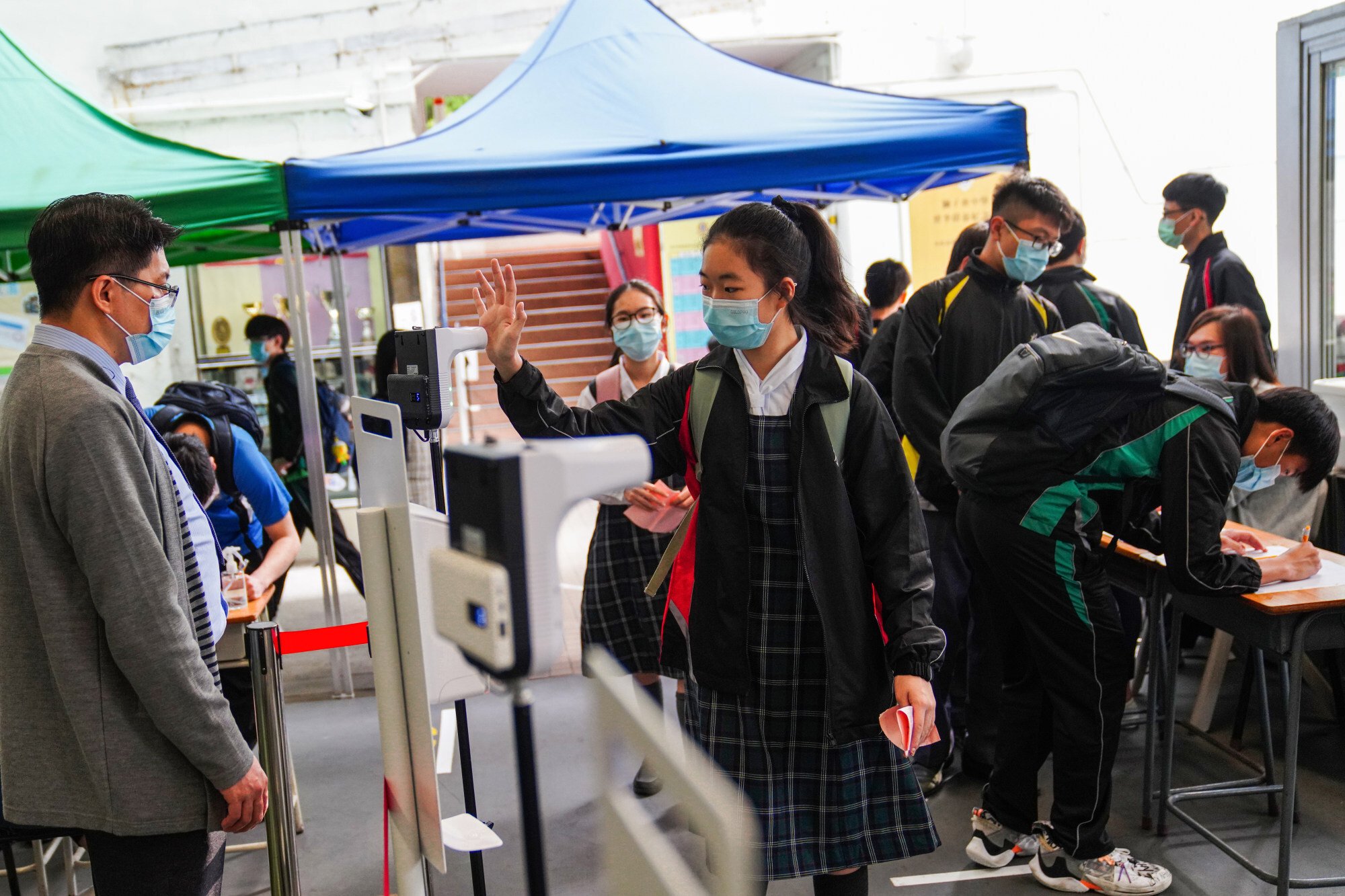
Hong Kong class sizes swell after Easter, but one in five schools ready to welcome back everyone
- Return of all students to in-classroom learning is conditional on regular coronavirus testing for teachers, something about 20 per cent of city’s schools have agreed to do, according to the Education Bureau
- Some schools, however, have found it difficult to make screenings mandatory for teachers they say are already pressed for time due to their workloads
The end of the Easter holiday means even more Hong Kong pupils flocked back to campus this week under new rules allowing two-thirds of students to be present for in-person classes, but some schools say they are ready for more.
Relaxed back-to-school rules for Hong Kong’s 900,000 kindergarten, primary and secondary school pupils were announced last month – up from the previous one-third cap – amid an improving pandemic situation and the launch of the city’s mass vaccination programme.

Some schools this week began bringing pupils back on Wednesday or Thursday, while the rest would see students return on Monday due to differing holiday schedules.
“I feel it’s definitely time to relax the rules. Many students and parents have already waited so long for the [announcement],” said Lions College principal Kwok Yui-ham, whose school was this week bringing two-thirds of its pupils back to the classroom.
Kwok’s school in Kwai Chung welcomed more than 500 secondary pupils from four of the six grades in the morning, with another 120 expected in the afternoon, with social-distancing and infection-control measures in place.
Machines to screen temperatures and dispense hand sanitiser had been installed at the campus’s entrance while mask-wearing was required.
I can get more help from teachers and classmates for subjects such as [mathematics]. During home learning, there can be many distractions
“I am really excited to be back. During online classes, there were fewer chances to chat and learn with my classmates,” Form Four student Daisy Deng Shuyi said.
“I also hope that lab sessions can resume for biology class … which I really enjoy. We haven’t been able to do them over the [past year].”
The 15-year-old pupil said she was now back in school about four days a week for face-to-face sessions, up from two days before the Easter holiday, as management had been arranging the return of different years on different days.
Another student, 16-year-old Jackson Wong, said he was looking forward to making progress now that he was spending more time on campus.
“I can get more help from teachers and classmates for subjects such as [mathematics],” Wong said. “During home learning, there can be many distractions, such as my phone.”
More than half of Hong Kong parents in subdivided flats say children studying in poorly lit areas
Government figures as of Wednesday showed that about 17 per cent, or 190 of some 1,100 primary and secondary schools – as well as 790 of about 1,050 kindergartens – were planning to, or had already brought back, all pupils for half days now they were screening their faculty fortnightly.
Education authorities last month also offered additional incentives, saying teachers who had been fully vaccinated would no longer need regular testing after 14 days had passed.
The government incentives, however, were criticised by some in the school sector, with a number of principals and teachers expressing concern about their feasibility.
While authorities were unable to provide a breakdown of how many teachers had received both jabs to date, official data showed that about 6.9 per cent of the city’s 7.5 million population had already received their first dose, while nearly 2 per cent, or 143,000 people, had been fully vaccinated.
Hong Kong’s liberal studies to be renamed ‘citizenship and social development’ as part of overhaul
Kwok, the principal, said his school so far had no plans to screen all 100 teachers and staff or make vaccination mandatory given that employees might have different health conditions.
“Although we hope more pupils can return … having all teachers tested every two weeks can be quite a burden given they already have a lot of work to do,” he explained.
“We also encourage our [teachers] to get vaccinated. They can also receive the jab during working hours as long as it doesn’t affect teaching.”
He also said that Lions College would be among the more than 400 secondary schools used as test centres for this year’s public university entrance exams.
Some pupils were expected to temporarily return to online learning during the April 23-May 20 exam period to minimise the flow of people, he said.
More than 50,000 candidates are expected to sit the Diploma of Secondary Education exams.

